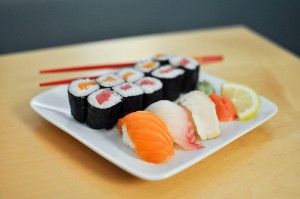 Cy has been talking about all these stories he has been running across where the consumer is buying food items that are misrepresented. A few examples are fake honey, calamari (we hope this one is not true because it is nasty), and lemon juice. The big story that we keep hearing again and again is how often you are told you are buying one kind of fish (at a fish store or sushi bars) when you are actually purchasing another. A fish (escolar) that is often substituted for white tuna in sushi bars, can even cause “serious digestive issues.”
Cy has been talking about all these stories he has been running across where the consumer is buying food items that are misrepresented. A few examples are fake honey, calamari (we hope this one is not true because it is nasty), and lemon juice. The big story that we keep hearing again and again is how often you are told you are buying one kind of fish (at a fish store or sushi bars) when you are actually purchasing another. A fish (escolar) that is often substituted for white tuna in sushi bars, can even cause “serious digestive issues.”
From Dr. Oz:
“As part of our campaign, Oceana conducted DNA testing of seafood meals in multiple cities across the country to get to the bottom of how much bait and switch was occurring. What did we find? Everywhere we tested, we found seafood fraud: 39% of seafood tested in New York, 55% in Los Angeles, 31% in Miami, and 48% in Boston (including testing by The Boston Globe) were mislabeled as entirely different types of fish than listed on the label. ”
Oceana sent me their DC-specific story.
-JAY
———————————————————————————
“Oceana Study Uncovers Widespread Seafood Fraud in Washington, Nationwide
26% of Seafood Mislabeled in D.C. Grocery Stores, Restaurants & Sushi Venues
WASHINGTON—Oceana, the largest international advocacy group working solely to protect the world’s oceans, uncovered widespread seafood fraud across the United States, including in the nation’s capital, according to a new report released today. As part of one of the largest seafood fraud investigations in the world to date, DNA testing confirmed that 26 percent of the 105 seafood samples collected by Oceana in Washington, D.C., and one-third, or 33 percent, of the 1,215 fish samples collected nationwide were mislabeled, according to U.S. Food and Drug Administration (FDA) guidelines.

